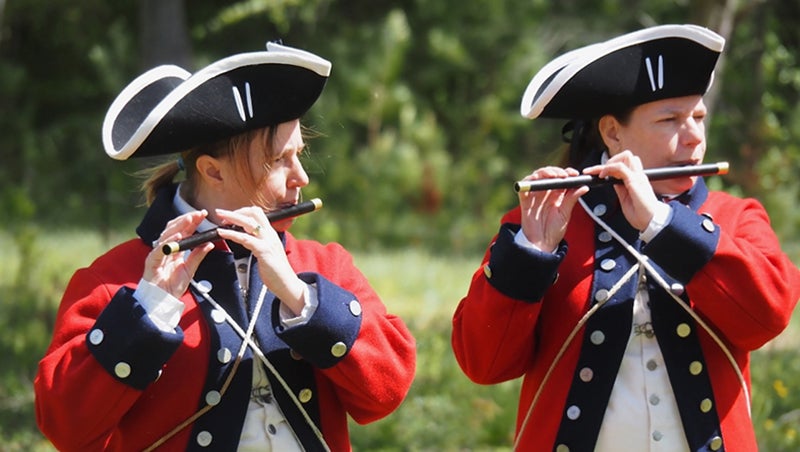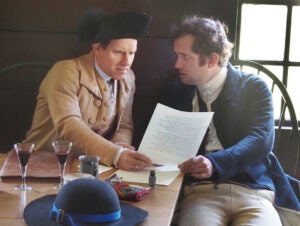Prelude to Revolution: America’s 250th celebration begins
Published 4:25 pm Tuesday, April 16, 2024

- Revolutionary War re-enactors were part of this past weekend’s kickoff celebration of America’s 250th anniversary held in Historic Halifax. Photo by Lance Martin
|
Getting your Trinity Audio player ready...
|
By LANCE MARTIN
rrspin.com
HALIFAX – The kickoff celebration of America’s 250th anniversary began Friday, April 12 in Historic Halifax with living history exhibitions for school children, the Sons of the American Revolution wreath-laying ceremony, and an afternoon program.
From the North Carolina National Guard to everyday citizens, the stories of people of color who served in the American Revolution were shared during the event held in Halifax.

Shown here is a re-enactment of delegates looking over the Halifax Resolves document, which in April of 1776 was the first official act by any of the 13 colonies calling for independence from Great Britain. Photo by Lance Martin
“As we enter this period of reflection of this semiquincentennial, we should not only share this history of the North Carolina National Guard and those well-known stories but also those whose stories are less well-known and fought for our freedom,” said Brigadier General Wesley Morrison, a Halifax County native who spoke during Friday’s program presented by the Historical Halifax Restoration Association.
A program on Saturday at First Baptist Church in Halifax focused on the work of Tyrone Goodwyn, Luke Alexander and Kevin Graham in tracing their family links to the revolution.
Morrison noted a case by William Bryan who was giving in-court testimony to an African American’s petition for pension for his service in the Revolutionary War. Quoting Bryan, he said, “In the times of our Revolutionary War free negroes and mulattoes mustered in the ranks with white men, equally liable to draft and frequently volunteered.”
Said Morrison: “It was an integrated militia and army, something North Carolina would not have again until well into the second half of the 20th Century.”
He called on those attending to remember soldiers like John Day, who enlisted in Granville County in the Second North Continental Line and died at Valley Forge in 1778; Benjamin Flood of Halifax County who served 18 months on the North Carolina Continental Line; or Charles and Ambrose Franklin of the Halifax County Regiment North Carolina Militia who both died while serving in the Revolutionary War.
“If you say their names and tell their stories they are not forgotten,” Morrison said. “Today your North Carolina National Guard is proud to have units and citizen soldiers that are historically tied to these soldiers I’ve mentioned today and the units you see serving in your communities.”
Morrison acknowledged Lieutenant Colonel James Bond, a Northwest Halifax High School graduate who currently serves as the battalion commander of the 130th Attack Aviation Battalion — one of four in the entire United States Army National Guard.
“I’m proud to have James on my leadership team and leading our citizen soldiers,” Morrison noted.
Morrison told the audience that the North Carolina National Guard “looks forward to telling the stories of the North Carolina Militia … as we embark on this important 250th observance. We’ve always been there, always ready to protect our fellow citizens and our form of government as we all strive to form a more perfect union.”
About 5,000 African Americans fought for liberty as part of the Continental armies and navies, according to the Historic Halifax state historic site.
A panel at the visitor’s center tells the story of John Chavis, the former indentured servant of a Halifax attorney who enlisted in the Fifth Virginia Regiment in December of 1778 and went on to become the first African American Presbyterian minister in the United States.
The exact number of Halifax County African Americans who enlisted during the revolution is being studied.
For Sandra Bryant, a Roanoke Rapids City Council member who is also part of Halifax County’s Underground Railroad Network to Freedom effort, her family ties to the American Revolution were only recently discovered.
“I stand before you today as an African American woman to say that we also fought in the American Revolutionary War,” she told the audience at Friday’s program. “Some of us were fighting for freedom from slavery. I vaguely remember hearing that some Blacks were promised freedom if they fought in the war. That was all I knew about Blacks fighting in this war.”
But, she said, “That all changed a few months ago when I discovered that I had a family member who also served during the American Revolutionary War.”
After very extensive research with her son, Kevin Walden Bryant and others, and a trip to the National Archives in Washington, research documented that her fifth great-grandfather “was a free black man and patriot from Northampton County that served three tours and was compensated a sum of $38.33 for each tour.”
His name was Drury Walden and he was born around 1762 in Surry County, Virginia. He married Elizabeth Harris and they were parents to nine children. He was a farmer with a 173-acre farm in Northampton County near the Occoneechee Neck area.
In September of 1832, Walden swore under oath that in 1779 he was drafted for five months in the former Bute County — today Warren and Franklin counties — as a musician in Captain Charles Allen’s Company — the Fourth Regiment North Carolina Militia, which was commanded by Colonel Thomas Eaton of the Bute County Regiment.
They marched to Georgia, crossed the Savannah River at Augusta and went down the river to Briar Creek where they had an engagement on March 3, 1779.
Troops were commanded by General John Ashe of the militia and General Samuel Eibert of the regulars. Lord Cornwallis and Colonel Hamilton commanded the British. The Americans retreated and they went to Pughsbury, South Carolina where he stayed until he was discharged by Colonel Eaton.
Walden later enlisted for three months under Colonel Nicholas Long who was commissary general of the North Carolina Militia and was stationed in Halifax. He worked making gun carriages for the cannon, canteens for soldiers and building barracks.
His third tour was in 1781 and he served as a substitute for Edward Jackson, a private in Captain Kidd’s company again in Halifax. He worked as a guard for the jail in Halifax that was filled with tories.
“The contributions of my ancestor, Drury Walden, made a positive impression on me and one of extreme pride. I am over 65 years old and just learning this history. It was quite a spiritual experience when I visited the National Archives and touched papers almost 250 years old that were signed by my fifth great-grandfather, Drury Walden,” Bryant said. “I will make sure that my grandchildren will know this history and share it with future generations.”
In closing her remarks, she said, “I am Sandra Walden Bryant, daughter of Nelvin C. Walden, granddaughter of Ollie Inez Walden Fox, great-granddaughter of Charlie H. Walden, great, great-granddaughter of Berry L. Walden, great, great, great-granddaughter of Augustus Dudley Walden, great, great, great, great-granddaughter of Armstead Walden, and great, great, great, great, great-granddaughter of Drury Walden.”
Other events held during the weekend included a Haliwa-Saponi ceremony at Magazine Springs, weapons demonstrations, and a re-enactment of the events which led to the crafting of the Halifax Resolves.
Sunday events included tours of the Historic Site buildings, the Continental Army camp, Market Square, and vendors on King Street, the new Life and Times of W.R. Davie exhibit at the Davie House and living history exhibits including hearth cooking and blacksmithing at the Bradford-Denton House.
In the spring of 1776, delegates from across North Carolina met in Halifax to take part in the 4th Provincial Congress, the forerunner to the modern legislature. On April 12, 1776, the 85 delegates to the Provincial Congress unanimously approved the Halifax Resolves. It was the first official act by any of the 13 colonies calling for independence from Great Britain.
(Lance Martin is the Editor and Publisher of rrspin.com. Permission was received to publish this story and the accompanying photos.)





